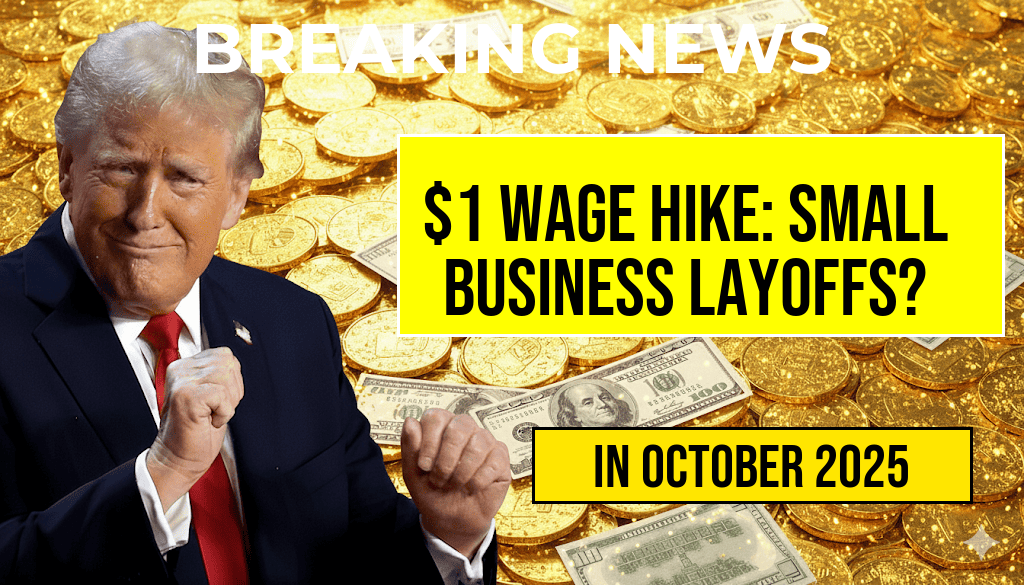The debate surrounding minimum wage increases has intensified, particularly with the recent proposal to raise the federal minimum wage by $1. Advocates argue that a wage increase is essential for enhancing the living standards of workers, while critics warn that it may compel small businesses to resort to layoffs or automation to offset rising labor costs. As the economy grapples with inflation and labor shortages, this issue raises significant questions about the sustainability of small businesses and their ability to adapt to changing economic realities. Understanding the implications of this wage increase is crucial for stakeholders, including employees, business owners, and policymakers.
Understanding the Minimum Wage Proposal
The current federal minimum wage stands at $7.25 per hour, a rate that has not changed since 2009. The proposed increase to $8.25 has sparked discussions across various sectors. Proponents of the wage hike emphasize that it could provide much-needed financial relief to low-income workers, helping them meet increasing living costs. According to the Economic Policy Institute, nearly 40 million workers would benefit from a wage increase, which could help stimulate consumer spending and contribute to economic growth. Source
Concerns Over Small Business Viability
On the flip side, small business owners express concern that rising wages could threaten their profitability. A survey conducted by the National Federation of Independent Business (NFIB) indicates that many small businesses operate on thin margins, making them particularly vulnerable to increased labor costs. Source
Potential Impact on Employment
- Increased Labor Costs: A $1 increase in minimum wage can significantly impact small businesses that rely heavily on hourly workers. Many owners fear that they may need to cut back on staff or reduce hours to manage increased payroll expenses.
- Automation Trends: Small businesses may turn to automation as a cost-saving measure. With advancements in technology, tasks traditionally performed by humans, such as order-taking and inventory management, can now be automated, potentially leading to job losses.
- Employee Retention: Higher wages could improve employee satisfaction and retention, but the financial strain may counterbalance these benefits, leading to a precarious situation for small business owners.
Case Studies from Various Industries
To better understand the implications of a wage increase, examining specific industries can provide valuable insights.
| Industry | Potential Response | Long-term Effects |
|---|---|---|
| Retail | Implementing self-checkout systems | Reduced staffing needs but improved customer experience |
| Restaurants | Reducing operating hours | Potential decline in customer service quality |
| Manufacturing | Investing in machinery | Increased efficiency but fewer entry-level jobs |
Long-term Economic Considerations
The potential for layoffs and increased automation raises questions about the long-term landscape of employment in the U.S. economy. Automation has already been reshaping various industries, and a minimum wage increase could accelerate this trend. A report from the McKinsey Global Institute predicts that by 2030, as many as 375 million workers may need to switch occupational categories due to automation. This could lead to a significant shift in the labor market, challenging workers to adapt to new roles and industries.
Policy Recommendations and Future Outlook
As lawmakers consider the proposed wage increase, a balanced approach is essential. Policymakers could explore measures to support small businesses during this transition, such as tax incentives or funding for technology adoption. Additionally, training programs aimed at upskilling workers can help prepare the workforce for a more automated economy.
The conversation surrounding the minimum wage is complex and multi-faceted. Stakeholders must weigh the benefits of increased wages against the potential repercussions for small businesses and the broader economy. As discussions continue, it’s vital to remain informed about both the immediate and long-term effects of wage policy changes.
Frequently Asked Questions
Will a $1 wage increase lead to layoffs in small businesses?
A $1 wage increase could potentially lead to layoffs in some small businesses, especially if they are already operating on tight margins. However, the impact varies depending on the industry and the specific business model.
How does automation factor into the wage increase discussion?
As minimum wages increase, many small businesses may consider automation as a cost-saving measure. This could lead to reduced hiring or layoffs as businesses invest in technology to maintain profitability.
What are the potential benefits of a wage increase for small businesses?
A wage increase can lead to improved employee morale and retention, reducing turnover costs. Additionally, higher wages may increase consumer spending, benefiting small businesses in the long run.
Are there specific industries more affected by wage increases?
Industries such as retail and hospitality are often more sensitive to wage increases due to their reliance on low-wage workers, making them more susceptible to layoffs or automation.
What strategies can small businesses adopt to manage wage increases?
Small businesses can explore various strategies, such as improving operational efficiency, investing in technology, and adjusting pricing structures to offset the impact of wage increases while minimizing the risk of layoffs.

Leave a Reply